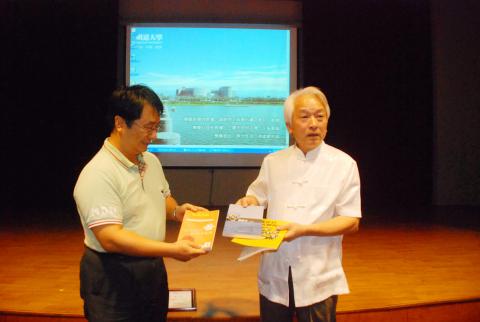Rick Chu (朱立熙), chief executive officer of the Taiwan-based Korean Studies Academy, yesterday accused the Chinese Nationalist Party (KMT) of a breach of copyright after the party allegedly copied his work for a completely different end than it was intended for.
The KMT caucus on Friday presented hundreds of pages of proposed revisions to a draft bill on ill-gotten party assets with the apparent aim of obstructing the bill’s passage by having the documents all read aloud in the legislature.
Revision proposals regarding the name of the bill and one of its articles alone were 300 pages of text, with a large portion of that being explanations of why the revisions were proposed.

Photo: Yen Hung-chun, Taipei Times
Most of the text was found to be passages taken from existing work, including legal texts, Council of Grand Justices interpretations, academic articles, newspapers editorials and the KMT’s own media releases.
One of the academics whose work was reportedly quoted extensively said that the KMT had “copied and pasted” his writing.
An article by Chu on South Korea’s democratic transition was cited almost in its entirety in the revision proposal, Chu said, adding that the KMT had written a conclusion that distorted the ideas of his article.
Chu, a former Taipei Times editor-in-chief who is also a lecturer at Chengchi University’s Department of Korean Language and Culture, said he is supportive of the Democratic Progressive Party’s efforts to deal with ill-gotten party assets and is extremely disappointed with the KMT’s continued obstruction tactics.
He likened the KMT to those implicated in heists targeting automated teller machines in Taipei last week.
What is most despicable is that the party reached a conclusion in its proposal that is completely opposite to the viewpoint in the article, Chu said.
Chu said he felt “raped by the KMT” and would sue the KMT for copyright infringement.
While he said he does not mind his articles being shared, even without attribution, it is unbearable and unforgivable when it is used to support an opposite conclusion, he said.
KMT caucus secretary-general Lin Te-fu (林德福) said attribution was included for Chu’s article.
Lin said that because of new developments, Chu’s words might be dropped in the party’s final version.
Additional reporting by Tseng Wei-che

AGING: As of last month, people aged 65 or older accounted for 20.06 percent of the total population and the number of couples who got married fell by 18,685 from 2024 Taiwan has surpassed South Korea as the country least willing to have children, with an annual crude birthrate of 4.62 per 1,000 people, Ministry of the Interior data showed yesterday. The nation was previously ranked the second-lowest country in terms of total fertility rate, or the average number of children a woman has in her lifetime. However, South Korea’s fertility rate began to recover from 2023, with total fertility rate rising from 0.72 and estimated to reach 0.82 to 0.85 by last year, and the crude birthrate projected at 6.7 per 1,000 people. Japan’s crude birthrate was projected to fall below six,

Conflict with Taiwan could leave China with “massive economic disruption, catastrophic military losses, significant social unrest, and devastating sanctions,” a US think tank said in a report released on Monday. The German Marshall Fund released a report titled If China Attacks Taiwan: The Consequences for China of “Minor Conflict” and “Major War” Scenarios. The report details the “massive” economic, military, social and international costs to China in the event of a minor conflict or major war with Taiwan, estimating that the Chinese People’s Liberation Army (PLA) could sustain losses of more than half of its active-duty ground forces, including 100,000 troops. Understanding Chinese

US President Donald Trump in an interview with the New York Times published on Thursday said that “it’s up to” Chinese President Xi Jinping (習近平) what China does on Taiwan, but that he would be “very unhappy” with a change in the “status quo.” “He [Xi] considers it to be a part of China, and that’s up to him what he’s going to be doing, but I’ve expressed to him that I would be very unhappy if he did that, and I don’t think he’ll do that. I hope he doesn’t do that,” Trump said. Trump made the comments in the context

SELF-DEFENSE: Tokyo has accelerated its spending goal and its defense minister said the nation needs to discuss whether it should develop nuclear-powered submarines China is ramping up objections to what it sees as Japan’s desire to acquire nuclear weapons, despite Tokyo’s longstanding renunciation of such arms, deepening another fissure in the two neighbors’ increasingly tense ties. In what appears to be a concerted effort, China’s foreign and defense ministries issued statements on Thursday condemning alleged remilitarism efforts by Tokyo. The remarks came as two of the country’s top think tanks jointly issued a 29-page report framing actions by “right-wing forces” in Japan as posing a “serious threat” to world peace. While that report did not define “right-wing forces,” the Chinese Ministry of Foreign Affairs was